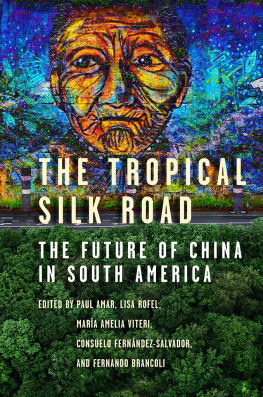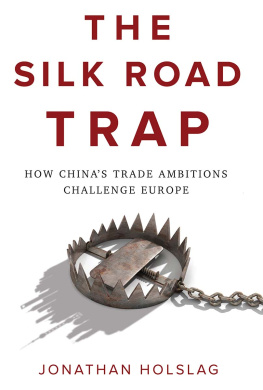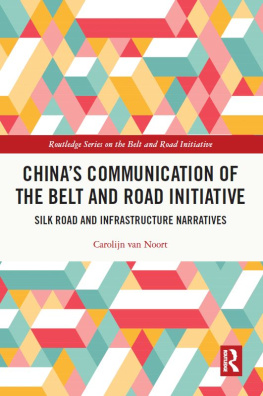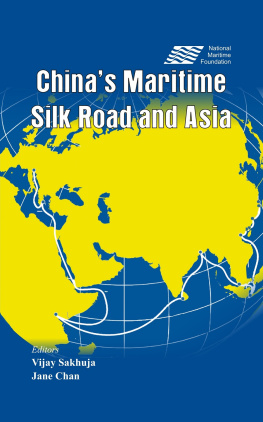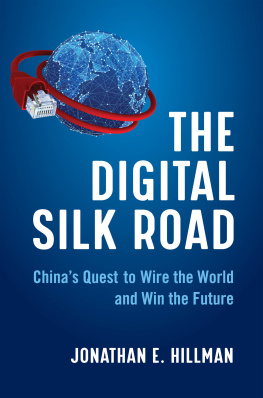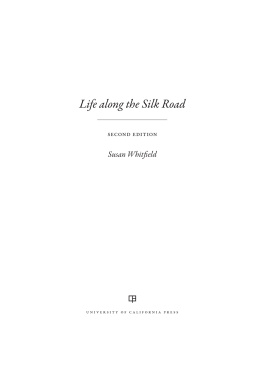THE TROPICAL SILK ROAD
The Future of China in South America
Edited by Paul Amar, Lisa Rofel, Mara Amelia Viteri, Consuelo Fernndez-Salvador, and Fernando Brancoli
Stanford University Press
Stanford, California
STANFORD UNIVERSITY PRESS
Stanford, California
2023 by the Board of Trustees of the Leland Stanford Junior University.
All rights reserved.
No part of this book may be reproduced or transmitted in any form or by any means, electronic or mechanical, including photocopying and recording, or in any information storage or retrieval system, without the prior written permission of Stanford University Press.
Printed in the United States of America on acid-free, archival-quality paper
Library of Congress Cataloging-in-Publication Data
Names: Amar, Paul (Paul Edouard), 1968- editor. | Rofel, Lisa, 1953- editor. | Viteri, Mara Amelia, editor. | Fernndez Salvador, Consuelo, editor. | Brancoli, Fernando, editor.
Title: The tropical silk road : the future of China in South America / edited by Paul Amar, Lisa Rofel, Mara Amelia Viteri, Consuelo Fernndez-Salvador, and Fernando Brancoli.
Description: Stanford, California : Stanford University Press, 2022. | Includes bibliographical references and index.
Identifiers: LCCN 2022008366 (print) | LCCN 2022008367 (ebook) | ISBN 9781503633193 (cloth) | ISBN 9781503633803 (paperback) | ISBN 9781503633810 (ebook)
Subjects: LCSH: Investments, ChineseSouth America. | South AmericaForeign economic relationsChina. | ChinaForeign economic relationsSouth America. | South AmericaEconomic conditions21st century. | South AmericaSocial conditions21st century. | South AmericaEnvironmental conditions.
Classification: LCC HF1508.Z4 T86 2022 (print) | LCC HF1508.Z4 (ebook) | DDC 337.5108dc23/eng/20220803
LC record available at https://lccn.loc.gov/2022008366
LC ebook record available at https://lccn.loc.gov/2022008367
Cover design: Rob Ehle
Cover images: Mural in Amazon region of Ecuador, Paul Amar; aerial photo of forest, PxHere
Typeset by Newgen in 10.2/14.4 Minion Pro
Contents
Paul Amar, Lisa Rofel, Mara Amelia Viteri, Consuelo Fernndez-Salvador, and Fernando Brancoli
Li Zhang
Pedro Gutirrez Guevara, Sofa Carpio, and Mayra Flores
Zhou Zhiwei
Milton Reyes Herrera
Andrea Piazzaroli Longobardi
David Mosquera Narvez
Lusa Pontes Molina and Alessandra Korap Silva Munduruku
Jefferson Pullaguari
Julia Correa, Israel Chumapi, Pal Ghaitai Males, Jennifer Yajaira Masaquiza, Rina Pakari Marcillo, and David Menacho
Cai Yiping and Sonia Correa
Gustavo Oliveira
Laura Trajber Waisbich
The Yasunidos Guapondlig Collective
Ana Saggioro Garcia and Rodrigo Curty Pereira
Karolien van Teijlingen and Juan Pablo Hidalgo Bastidas
Emilia Bonilla
Alana Camoa and Bruno Hendler
Sabrina Felipe and Lucilene Raimunda Costa
Sigrid Vsconez D.
Las Forti Thomaz, Aline Regina Alves Martins, and Diego Trindade dvila Magalhes
Consuelo Fernndez-Salvador and Mara Amelia Viteri
Diana Aguiar
Maria Elena Rodrguez
Ana Luisa Queiroz, Marina Praa, and Yasmin Bitencourt
Fernando Brancoli and Wander Guerra
Pedro Henrique Vasques
David F. Delgado del Hierro
Cleiton Ferreira Maciel Brito
Rui Jie Peng
Marcos A. Pedlowski
Acknowledgments
This collectively produced volume reflects the hard work, creativity, and vision of a group of scholars on four continents, all responding generously, fiercely, and brilliantly to the challenges of a set of intersecting crises. We would like to thank here our colleagues and team members who made this collective exercise in global knowledge production and public engagement possible.
First, we would like to acknowledge each others efforts, those accomplishments from among our team who made special efforts and faced certain risks and terrific challenges to launch and guide our project research and team formation. We thank Professor Lisa Rofel for her bold and visionary leadership that initiated this project and the community around it. Her brilliance, inclusiveness, innovative methodologies, and collective-oriented research ethic have served as models for all of us, and this book and the projects that generated it would not exist without her. Paul Amar is the sine qua non of this book project. This book simply would not exist without his leadership, creativity, and capacity to manage a research team across four continents and four languages. We also offer deepest thanks to Professor Maria Amelia Viteri and Professor Consuelo Fernndez-Salvador, who elaborated a profound and inclusive network of case-study sites, research partners, activist contacts, and trusted students and collaborators in Ecuador and in the Amazon region. We are grateful for all the support from Universidad San Francisco de Quito (USFQ) starting with the provost at the time, Carlos Montfar, and the dean of the School of Social Sciences, Carmen Fernndez-Salvador, who brought us together with professors working in similar areas of interest such as Jos Salazar to foster further collaborative work. This preparation enabled our research and collective knowledge-formation project to bring on board Indigenous student activists from across the country, Indigenous leaders, feminist activists, LGBTQI+ movements, lawyers, journalists, Chinese business and project specialists, ecologists, economists, and community leaders. This group also set up a conference that brought together stakeholders and researchers in Quito as well as working meetings in Cuenca and in the Amazonian area of Tundayme, Ecuador. Our heartfelt thanks to Kaleidos Center for Interdisciplinary Ethnography and LGBQTI+ activist Pedro Gutierrez for his support in convening key actors on a very tight schedule while travelling from Cuenca to the Amazon. Also, many thanks to Dr. William Sacher from Universidad Andina Simn Bolvar in Quito for his compelling insights and vast experience regarding large-scale mining in the Amazon Region, and to INSUCO (Observatorio de Transformaciones TerritorialesLos Encuentros) for sharing valuable information from their work that addresses social dynamics in a mining project in the province of Zamora. In El Chaco, province of Napo, Ecuador, the information and support provided by the mayor, Ing. Javier Chvez, was key for the team to be able to understand the socioeconomic dynamics around the Coca Codo Sinclair project. We are also very appreciative of the opportunity provided by Ing. Marcelo Reinoso, manager of CELECs Business Unit, to visit Project Coca Codo Sinclair and provide a guide to explain the water intake facility, and other technical details of the project.
For Brazil, Fernando Brancoli and Paul Amar spearheaded the selection of case-study sites, research networks, and partners among Indigenous leaders, youth activists, investigative journalists, social movement leaders, Black quilombolas, feminist movements, engineers, businessmen, political-economy specialists, political ecologists, anthropologists, and geographers. And this group produced a major interdisciplinary conference on Chinas Futures in South America hosted in March 2020 at the ABIA NGO in Rio de Janeiro, which included experts from China and across South America, and whose participants were identified with the expert assistance and generosity of Professor Lena Lavinas and Professor Monica Herz. We would also like to thank Sonia Correa and the staff at ABIA for hosting this conference and for their generous advice and guidance in how to manage the COVID-19 risks and context that was materializing around us ominously right at that time. We would also like to express our profound gratitude to our Chinese colleague Cai Yiping, specialist in international gender policy, development, and Chinese diplomacy in the Global South, who very much shaped this project but was trapped by the first wave of COVID lockdowns in Beijing and so was unable to join us for the research missions. Beijing-based documentary filmmaker He Xiaopei, a member of our research team, captured our work on film in all its complexity. Her Mandarin Chinese translation as we met with Chinese workers and businessmen in South America was a crucial added bonus. She is producing a set of wonderful short documentary films that track our research and this volumes themes.

